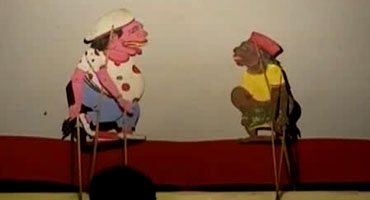
 Saya setuju
Saya setuju
.
Wayang Kampung Sebelah (2011)
Dalang: Jlitheng Suparman
Cara penulisan kutipan: Jlitheng Suparman ([2011] 2016), Wayang Kampung Sebelah [The Wayang from the Neighboring Town], translation and notes by Miguel Escobar Varela, Yosephin Novi Marginingrum and Indraswari Kusumaningtyas. Singapore: Contemporary Wayang Archive. Retrieved from http://cwa-web.org/en/WayangKampungSebelah.
Ringkasan (Bahasa Inggris)
Kampret wants to become a contemporary art painter. He discusses this with his friend Karya and with an art curator. He then organizes a series of music performances by people who resemble famous Indonesian singers. When they try to collect their fees, Kampret promises he will pay them once he receives money for his paintings.
Sumber lakon: Keadaan Terkini
Iringan: Pop, Dangdut
Artistik: Gedebog, Kelir Wayang, Panggung Teater
Pemain: Dalang Tunggal
Jenis wayang: Wayang Garapan
Bahasa: Bahasa Jawa
Catatan Teknik (Bahasa Inggris)
Catatan: Wayang Kampung Sebelah is the name of a performance genre by Ki Jlitheng Suparman. This particular performance does not have a unique title but was performed for the opening of the Langgeng Art Foundation (LAF) on 12 May 2011.
Diproduksi oleh: Langgeng Art Foundation
Direkam di: Langgeng Art Foundation, Yogyakarta
Pemeran dan kru
Music composer: Yayat Suhiryatna
Guitar: Max Baihaqi
Drum: Erwin Gustaf
Bass guitar: Nadias Rushendro Nugroho
Kendang : Kukuh Widiasmoro
Djimbe: Yayat Suheryatna
Sax: Gendot Dekanipa
Singers: Dwijaya Syaiful Munir, Cahwati.
Melihat metadata untuk file ini.
Translation and notes by Miguel Escobar Varela (MEV), Yosephin Novi Marginingrum (YNM) and Indraswari Kusumaningtyas (IK).
1. The song is interrupted by several interjections from other performers: Permisi, om! [Excuse me uncle], Makasih ya, om! [Thank you uncle]. This alludes to street performers who ask for monetary contributions from spectators YNM.2. In Java, it is said that people who sleep early will lose their fortune, food and clothes IK.
3. Here they speak in the Bayumas dialect of the Javanese language YNM.
4. The Pohon waru or Hibiscus tiliaceus is a flowering tree common in Southeast Asia YNM.
5. Lènggèr, also known as ronggèng is a traditional dance form from Banyumas which is performed by two to four female dancers clad in traditional clothes YNM.
6. Makasih cĕthil [thank you for being cheap] is s a joke often told by street musicians to those who give them money YNM.
7. The melody of the last two verses is an adaptation of the children’s song Pelangi-pelangi [The Rainbow] YNM.
8. Bakso is a traditional meatball dish often sold in wayang performances and other forms of popular entertainment MEV.
9. Mercy is a slang term for a Mercedes-Benz car MEV.
10. This show was performed in the opening Langgeng, a contemporary visual art gallery in Yogyakarta MEV.
11. Word play. It is implied that cubism, pronounced kobisme means drawing kobis [cabbage] in the same way that taugisme means drawing tauge [bean sprout] MEV.
12. The ciu is a well known alcoholic drink from Bekonang MEV.
13. Lambému [your lips] is a playful insult in Javanese MEV.
14. Enin Supriyatno is an internationally recognized curator and art writer, originally from the Indonesian island of Lombok MEV.
15. Binal [wild] IK.
16. Dr Oei Hong Djiem is one of the most influential curators in Indonesia. Originally from Magelang, Central Java, he is also an art collector and a professional tobacco grader for the Djarum Kudus Company YNM.
17. Koh is a Chinese-Indonesian term of address for older brothers IK.
18. Nyětitis [to feel cold] is used here to mean someone is alone IK.
19. Marzuki Mohamad, a.k.a “Kill the DJ” is a musician and visual artist from Yogyakarta. He is the front man of the group Jogja Hip Hop Foundation (JHF) MEV.
20. This is a reference to the song Jula-Juli by Jogja Hip Hop foundation. The joke is that, despite the allusion to the candy, the song is not for children. The next verse, not mentioned here, is karyané laris tur sěniné mati [when artists become popular their art dies] MEV.
21. Internasiokal a compound term suggesting both local and international affinities MEV.
22. Maduranese dialect: Ta' iyěh [isn't that so?] IK.
23. Cak, not included in the honorifics list is a term of address for male interlocutors older than oneself, it is similar to mas MEV.
24. Maduranese people often work as scavengers in Java IK.
25. Rèk or arèk is used to address younger male interlocutors in Maduranese and Eastern Javanese dialects YNM.
26. An alleged sex video of artists Ariel "Peterpan" and Luna Maya shook up the Indonesian media in 2010. Peterpan was sentenced to a short prison term MEV.
27. Cut Tari is a lesser-known artist also involved in the sex video MEV.
28. Koma ra mari-mari [in coma and not getting better] is a wordplay on the name of Rhoma Irama, the father of dangdut MEV and YNM.
29. Usually, there is a strong echo when Rhoma Irama speaks in his performances YNM.
30. Ghibah [backbiting], to gossip or speak ill about someone who is not present IK.
31. An Indonesian proverb meaning that one easily sees other peoples' flaws, but does not realize one's own IK.
32. The original verse in the Qur'an states this as a question: "Do not backbite each other. Would you like to eat the flesh of your dead brother?" IK.
33. Ora cĕtha [not clear] means that something is not the way it should be MEV.
34. Sampluk [to hit with the back of the hand]YNM.
35. Word play that alludes to Inul Daratista, a dangdut singer famous for including sensual dance moves in her choreographies MEV.
36. Hĕ ĕh, uttered at the end of each sentence, suggests the behavior of a spoiled kid YNM.
37. Word play, binatang pentas [animal of the stage] sounds like bintang pentas [star performer] MEV.
38. Bahtera [ship] is used here to symbolize marriage IK.
39. Cĕthing [a large bowl to place cooked rice] IK.
The honorifics in the original languages were retained in the subtitles. In Javanese and Indonesian, speakers address their interlocutors with over 40 different honorifics which denote differences in their relative status and level of intimacy.
ID = Indonesian
JW = Javanese
Adik. ID. Younger brother/sister. It is used for addressing younger people, not necessarily one's relatives.
Adinda. ID. Younger sister. More intimate than adik.
Babé. ID/Betawi. Familiar form of father, commonly used in Jakarta.
Bé. ID/Betawi. Short form of Babé, father. Jakartan slang.
Bang. ID. Older brother, short form of abang. If used with non-relatives, it is has the connotation of a slang, and is somewhat equivalent to “man” in English.
Bĕndara. JW. Master.
Bibi. JW/ID. Aunt. A way of addressing/referring to older women.
Bos. ID/JW. An adaptation of the English "boss". Used either to refer to one's superior or to a friend in a joking context, for example, when a person orders others around without realizing he/she is doing so.
Bu. ID/JW. Short form of ibu, mother.
Bung. ID. Similar to bang, but slightly less formal. It might mean "comrade". The political leaders of the independence war are often referred to with this term, for example Sukarno is often referred to as
Bung Karno.
Dara. JW. Short form of bĕndara, master.
Dèn. JW. Sir, master, used to address royalty. Short form of radèn.
Dhé. JW. Short form of pakdhé, uncle.
Dhik. JW. Short form of adhik. Younger brother/sister. It is used for addressing younger people, not necessarily one's relatives.
Éyang. JW. Grandfather.
Dimas. JW. Younger brother.
Gusti. JW. Lord. Used to address superiors and Gods.
Ibu. JW/ID. Mother. Used generically to address women who are older than the speaker.
Kakang. JW. Older brother.
Kakang mbok. JW. Older sister.
Kanda. ID. Older brother. Formal.
Kang. JW. Older brother. Informal.
Kangmas. JW. Older brother.
Kaki. JW. Uncle
Kang. JW. Older brother, used generically for men older than the speaker. It is a shortened version of kangmas).
Kakak. JW/ID. Older brother/sister, used generically for people who are older than the speaker.
Lé. JW. Son, short version of tholé.
Lik. JW. Often used between friends as a slang term of address. Uncle, "little father." Short form of {paklik}.
Ma. JW. Same as pak, short form of rama.
Mbak. JW/ID. Older sister. Used generically for women who are slightly older than the speaker.
Mamang. ID. Uncle.
Mang. ID. Uncle, short form of mamang.
Mas. ID. Older brother, used generically for men who are older than the speaker. Although it is also a shortened version of the Javanese kangmas people prefer to use mas in Indonesian and kang in Javanese.
Mas bro. ID. Slang used among male friends. In a way, it is a reduplication.
Mbah. JW/ID Grandfather, grandmother. It is used generically to address people who are much older than the speaker. Short form of simbah.
Mbok. JW. Mother, short form of simbok. Used generically for women who are older than the speaker.
Mbokdhé. JW. Aunt. Literally, "big mother".
Mbul. JW. Informal term of address between close male friends.
Ndara. JW. Master.
Nduk. JW. Daughter, short form of gĕndhuk.
Nggèr. JW. Son, short form of anggèr Used generically for people who are younger than the speaker, with whom the speaker is on intimate terms.
Nimas. JW. Younger sister.
Nok. JW. West Javanese term for daughter, short form of dhénok.
Nona. ID. Miss, unmarried woman.
Paduka. ID. Your Excellency.
Pak. JW/ID. Father, used generically for men who are older than the speaker.
Pakdhé. JW. Uncle. Used to refer to a man who is older than one's father.
Paman. ID. Uncle. Used to refer to a man who is older than one's father.
Pangéran. JW/ID. Prince.
Prabu. JW. King.
Radén. JW. Master, used for royalty.
Rama. JW. Father. It can also be used to designate catholic priests when one is speaking in Indonesian.
Simbah. JW/ID Grandfather, grandmother. It is used generically to address people who are much older than the speaker.
Sinuwun. JW. Very formal way to address a man, reserved for sultans, kings and Gods.
Siwa. JW. Term for addressing older people.
Siwak. JW. Same as Siwa. Term for addressing older people.
Tholé. JW. Son
Tuan. ID. In colonial contexts, this is the way foreigners are addressed but it can also mean sir.
Wa Nĕrpati. JW. Uncle king, equivalent to the Indonesian paman raja.
Wa. JW. For addressing older people, short form of siwa.
Yayi. JW. Younger brother/sister.
Yunda. JW. Older sister.
See the Translation conventions.
Share:
dalam terjemahan atau informasi video.
